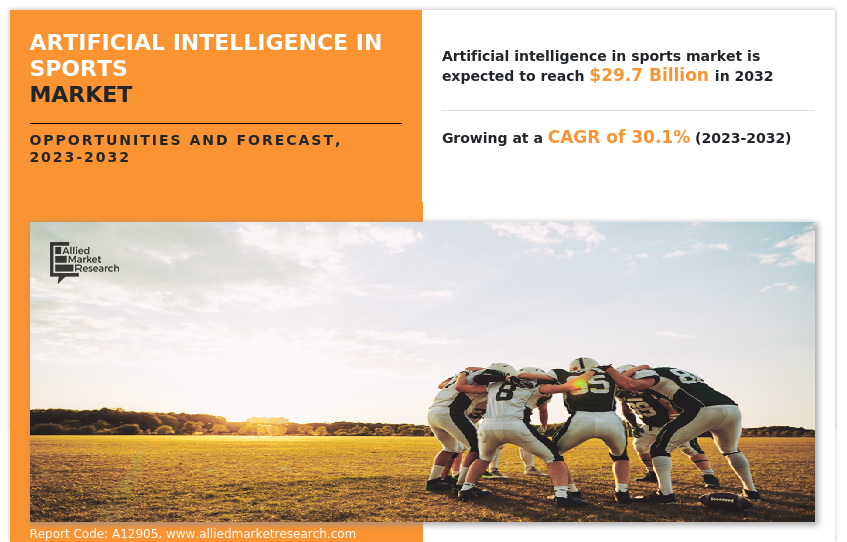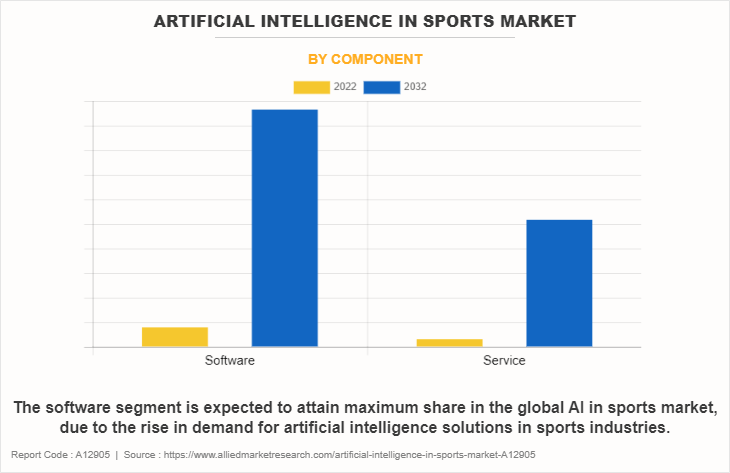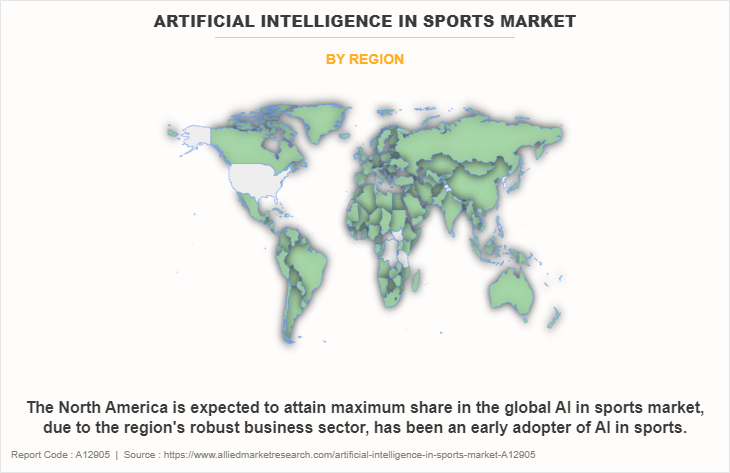Artificial Intelligence (AI) in Sports Market Overview
The global artificial intelligence (AI) in sports market size was valued at USD 2.2 billion in 2022, and is projected to reach USD 29.7 billion by 2032, growing at a CAGR of 30.1% from 2023 to 2032.
Increase in demand for monitoring and tracking data of players and surge in need for chatbots & virtual assistants to interact with followers act as the key driving forces of the global artificial intelligence in sports market growth. In addition, the expansion popular for ongoing information investigation decidedly influences the development of the market. However, the absence of prepared and talented experts and high execution and upkeep costs hamper the market development. On the contrary, surge in demand of AI in sports market for making future predictions is expected to offer remunerative opportunities for expansion of the market during the forecast period.
Key Market Insights
- By deployment model, the cloud segment is expected to exhibit the highest growth during the forecast period.
- By component, services segment is expected to exhibit the highest growth during the forecast period.
- By region, Asia-Pacific is expected to exhibit the highest growth during the forecast period.
Market Size & Forecast
- 2032 Projected Market Size: USD 29.7 Billion
- 2022 Market Size: USD 2.2 Billion
- Compound Annual Growth Rate (CAGR) (2023-2032): 30.1%

How to Describe AI in Sports
Sports data are being used by artificial intelligence (AI) to create comprehensible information about various sporting events. In addition, a virtual stage with computer based intelligence innovation gives a reasonable involvement with a virtual climate that matches the experience of seeing the live game. Moreover, Before, during, and after a game, coaches' strategic decisions continue to be significantly influenced by AI. With the help of wearable sensors and high-speed cameras, AI platforms measure a forward pass, a penalty kick, leg before cricket (LBW) in cricket, and a lot of similar actions in various sports.
AI in Sports Market Segment Review:
The AI in sports market is segmented into component, deployment model, technology, application, sports type, and region. Depending on the component, the market is bifurcated into software and services. By deployment model, it is categorized on-premises and cloud. On the basis of technology, it is fragmented into machine learning, natural language processing, computer vision, data analytics, and others. By application, it is segregated into game planning, game strategies, performance improvement, injury prevention sports recruitment, and others. As per sports type, it is classified into football, cricket, tennis, basketball, baseball, and others. Region wise, it is analyzed across North America, Europe, Asia-Pacific, and LAMEA.

On the basis of component, the global artificial intelligence in sports market share was dominated by the software segment in 2022 and is expected to maintain its dominance in the upcoming years, owing to the rise in demand for artificial intelligence solutions in sports industries, which further expected to propel the global market growth. However, services are expected to exhibit the highest growth during the forecast period. Services in the artificial intelligence in sports industry include a variety of products and services offered by businesses to help the sport sector to manage the sports related activities, which drives the market growth for this segment in the global AI in sports market.

By region, North America dominated the market share in 2022 for the artificial intelligence in sports market analysis. The presence of prominent players such as Microsoft Corporation, IBM Corporation and others is positively influencing the growth of artificial intelligence in sports market in this region. However, Asia-Pacific is expected to exhibit the highest growth during the forecast period. This is attributed to the increase in integration of digital technologies and higher adoption of advanced technology, which is expected to provide lucrative growth opportunities for the market in this region.
What are the Top Impacting Factors in AI in Sports Market
Drivers
Increase in Demand for Monitoring and Tracking Data of Players
Emerging technologies such as AI, big data, and IoT, are becoming essential components of sport in recent years, and are being used on a regular basis, especially in team sports for various applications such as monitoring movement patterns, which reveal important results regarding sport performance. In addition, AI analytics helps to quantify these results and the dynamic profile of players using global positioning systems (GPS). These devices have been defined as a valid tool for evaluating the external load in intermittent sports, with capacity to record real-time data about time, speed, distance, position, altitude, and direction, which make them common in the analysis of team sports.
Furthermore, the technology of a multiple-camera match analysis system, implemented in almost all European professional leagues and international competitions, has been demonstrated to be as reliable as GPS; it can obtain results in quantification with less than 5% of error, and has been proven valid for investigation. Thus, the increase in use of these systems for physical and tactical performance studies in different elite competitions drives the growth of the global AI in sports market. Therefore, artificial intelligence in sports gained wider traction among end-users, which in turn, is expected to fuel robust market growth.
Restraint
Lack of Trained & Skilled Professionals
The major challenge for the growth of global artificial intelligence in sports market is the limitation of skilled labor and knowledge of AI infrastructure. Smart AI devices consist of complex installation and connectivity management, which requires knowledge and decision-making skills. The increasing dearth of sophisticated abilities and a growing lack of awareness of digital technology is certainly restraining the adoption of artificial intelligence in sports across the globe. Further, the integration of highly sophisticated technologies and components to provide efficient, reliable, and safe services is expected to propel the global market growth.
However, these sophisticated technologies and equipment include difficult design, development, and implementation of digitalized systems, which is expected to be the major restraining factor for the growth of the global market. In addition, these technically advanced systems entail a combination of electronic components and several subsystems to offer real-time data. However, individuals with limited skillsets and software knowledge in installing and developing such complex infrastructure are expected to be the major obstacles to this market growth across the globe. Therefore, a lack of skilled labor and management is required for the installation and development of digital technologies in AI devices and thus, is projected to hamper to this the AI in sports market growth across the globe.
Opportunity
Upsurge in Demand for AI to Make Future Predictions
Advancements in the field of predictive analytics have led to the creation of predictive models that can compute probabilities of sports win/loss prospects and analyze the performance of players. AI is projected to increase the competitiveness in sports by a huge margin. With better sensors and algorithms, it will make better predictions of outcomes of competitions. AI is expected to impact advertisers, sports companies, franchise owners, coaches, as well as game strategists by helping target population and using contextual advertising and behavioral targeting to get the right advertisements in front of the right people. With such a wide scope of implementation, it is expected that the sports industry will adopt AI to gain a competitive edge over sports industry rivals.
Moreover, predictive analytics is being used for evaluating athletes, as it is crucial to look at how the player is performing in different phases. This is further used to determine the success of the athlete in sports depending on the player's skill and is associated with the team and nation of the athlete. These factors are encouraging many businesses to enhance their product portfolio in the global artificial intelligence in sports market. For instance, in December 2023, Humane launched AI Pin with unique artificial intelligence features. Ai Pin is a wearable gadget activated by voice command, conveying information to the user through its AI chatbot. Therefore, an increase in applications of predictive analytics is expected to provide lucrative opportunity for the growth of the AI in sports industry.
Which are the Leading Companies AI in Sports
The following are the leading companies in the market. These major players have adopted various key development strategies such as business expansion, new product launches, and partnerships, which help to drive the growth of AI in sports market size globally.
Catapult Group International Ltd.
Facebook Inc.
IBM Corporation
Microsoft Corporation
Salesforce.com Inc.
SAP SE
SAS Institute Inc.
Sportradar AG
Stats Perform
Trumedia Networks.
Which Companies have Announced New Partnerships and Product Launches Recently
Recent Partnerships in the Market
For instance, in December 2023, BeONE Sports partnered with MobiDev, to launch an AI-powered comparative training platform. The innovative solution leverages cutting-edge human pose estimation technology to elevate athlete performance. Athletes use this platform to receive real-time feedback and personalized training insights. Similar strategies by the market players operating at a global and regional level are expected to help the market to witness significant growth during the forecast period.
Recent Product Launches in the Market
For instance, in August 20 23, LootMogul launched MogulX.ai, to drive collaboration and AI development in the sports tech industry. Therefore, such strategies adopted by market players are increasing market competition and leading the growth of AI in sports market size.
Which Trends are Shaping the Competitive Landscape of the Market
The outbreak of COVID-19 is anticipated to have a positive impact on the growth of artificial intelligence in sports market. This is attributed to fans experiencing the future of virtual contact sports firsthand—and some are embracing it. In addition, the sports event organized on the stadiums usually have highly charged tickets, which, in turn, boosted the adoption of virtual monitoring, as it delivers optimal experience that maximizes user satisfaction. Moreover, to enabling real-time streaming of sporting events without the need for a camera operator, AI-powered equipment is also capable of producing statistical models, tactical analysis, and prediction analytics that can help coaches maximize their players' potential.
On the other hand, the pandemic has expanded the reception of remote helpers and chatbots as organizations endeavor to give contactless client care and backing. For instance, in May 2021, Veritone launched a new platform namely, marvel.AI, it which enables creators, media figures, and others to generate deep fake clones of synthetic voices. These factors are expected to have a less negative impact on the growth of the global artificial intelligence in sports market in the pandemic.
What are the Key Benefits for Stakeholders:
This report provides a quantitative analysis of the market segments, current trends, estimations, and dynamics of the artificial intelligence in sports market forecast from 2022 to 2032 to identify the prevailing market opportunities.
Artificial intelligence in sports market research is offered along with information related to key drivers, restraints, and opportunities of artificial intelligence in sports market outlook.
Porter's five forces analysis highlights the potency of buyers and suppliers to enable stakeholders to make profit-oriented business decisions and strengthen their supplier-buyer network.
In-depth analysis of the artificial intelligence in sports market segmentation assists in determining the prevailing AI in sports industry opportunity.
Major countries in each region are mapped according to their revenue contribution to the global market.
Market player positioning facilitates benchmarking and provides a clear understanding of the present position of the market players.
The report includes an analysis of the regional as well as global artificial intelligence in sports market trends, key players, market segments, application areas, and market growth strategies.
Artificial Intelligence in Sports Market Report Highlights
| Aspects | Details |
| Market Size By 2032 | USD 29.7 billion |
| Growth Rate | CAGR of 30.1% |
| Forecast period | 2022 - 2032 |
| Report Pages | 350 |
| By Component |
|
| By Deployment Model |
|
| By Technology |
|
| By Application |
|
| By Game Type |
|
| By Region |
|
| Key Market Players | IBM Corporation, SAP SE, SAS Institute Inc, Microsoft Corporation, Catapult Group International Limited., Salesforce.com Inc., TruMedia Networks, Stats Perform, Sportradar AG, Meta Platforms, Inc. |
Analyst Review
The artificial intelligence in sports market is characterized by intense competition, which can be attributed to the strong presence of established vendors. It is expected that artificial intelligence in sports providers, which possess extensive technical and financial resources, will have a competitive advantage over their competitors due to their ability to meet the global market needs. Furthermore, the competitive landscape within the market is anticipated to become even more intense as a consequence of technological advancements, product expansions, and various strategies employed by key vendors.
The artificial intelligence in sports market is anticipated to grow significantly during the forecast period. There are few major trends in artificial intelligence in sports market such as growing adoption of cloud-based solutions and surging emphasis on real-time sports information. These trends are positively impacting the overall artificial intelligence in sports market.
Moreover, managed artificial intelligence services in sports sector are witnessing an increase in popularity across diverse industry verticals and enterprises. These service operators help large enterprises manage their information technology infrastructure with the addition of advanced technological frameworks. This is also expected to fuel competition in the artificial intelligence in sports market. In addition, continuous developments in cloud-based platforms to cater to diverse customer requirements are expected to support the overall market growth.
In addition, with the increase in demand for artificial intelligence in sports services, various companies are expanding their current services to meet the rising demand of technical solutions. For instance, in August 2021, Catapult launched its wearable performance solution for the next generation of athletes, Catapult One. Created to deliver performance metrics to more than 3,200 elite teams worldwide, Catapult One provides players and coaches at all levels with the tools to track, analyze, and improve performance with professional-level accuracy. The new Catapult One membership empowers athletes and coaches with the most important metrics used by elite teams around the world, including sprint distance, acceleration, and intensity with 10 times the data of leading smart watches. With these insights, the best young players can dominate their competition, reach the next level, and prevent injury to prolong their careers.
Some of the key players profiled in the report include Catapult Group International Ltd., Facebook Inc., IBM Corporation, Microsoft Corporation, Salesforce.com Inc., SAP SE, SAS Institute Inc., Sportradar AG, Stats Perform, and Trumedia Networks. These players have adopted various strategies to increase their market penetration and strengthen their position in the artificial intelligence in sports market.
AI-powered solutions can continuously monitor systems, endpoints, and networks, enabling swift response and real-time visibility into any security breaches. This further leads to more accurate and effective sports operations. In addition, the increase in demand for behavioral analysis in several industries further contributes to driving growth of the global market. The AI systems are more trained, that further reduced the chances of false positives by improving accuracy of the sports solutions. Such enhanced factors are expected to provide lucrative opportunities for market growth during the forecast period.
The integration of intelligent AI solutions in various applications has the potential to create several benefits for businesses and end users. Moreover, these numerous benefits provide enhanced customer convenience and a better security experience. Consequently, AI in sports technology is gaining significant adoption to increase the use of automation systems among business operators.
North America is the largest regional market for Artificial Intelligence in Sports.
$29650.51 million is the estimated industry size of Artificial Intelligence in Sports Market.
Catapult Group International Ltd., Facebook Inc., IBM Corporation, Microsoft Corporation, Salesforce.com Inc., SAP SE, SAS Institute Inc., Sportradar AG, Stats Perform, and Trumedia Networks are the top companies to hold the market share in Artificial Intelligence in Sports market
Loading Table Of Content...
Loading Research Methodology...



